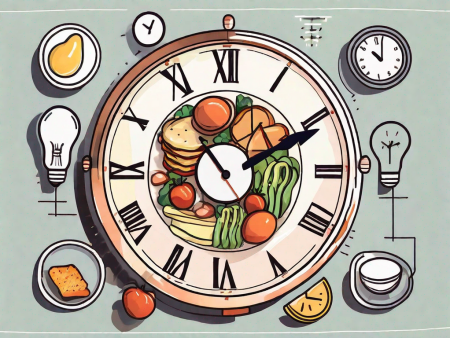Discover the fascinating connection between mineral intake and metabolism.
How Does Mineral Intake Affect Metabolism?
Ever wondered how the minerals you consume affect your metabolism? Well, buckle up and get ready to discover the fascinating connection between mineral intake and your body’s metabolic processes. From the nitty-gritty of metabolism to the impact of mineral deficiency, we’ll cover it all. So, let’s dive in and unearth the secrets of this mineral-metabolism relationship!

Understanding Metabolism
Before we delve into the intricate dance of minerals and metabolism, let’s get a grasp on what metabolism actually is. Essentially, metabolism is the sum of all the chemical reactions happening in your body to keep it functioning. It’s like a swirling cauldron of activity that breaks down nutrients, synthesizes molecules, and generates energy. Think of it as your body’s very own metabolic party!
Metabolism is a fascinating and complex process that is essential for the survival of all living organisms. It is the driving force behind everything our bodies do, from breathing and digesting food to running and even thinking. Without metabolism, life as we know it would not be possible.
The Role of Metabolism in the Body
Metabolism isn’t just about burning calories and fitting into those skinny jeans (although that’s a nice bonus!). It plays a vital role in keeping your body ticking like a well-oiled machine. From regulating body temperature to repairing tissues and even eliminating waste, metabolism is a workhorse that never takes a break!
One of the key functions of metabolism is to provide the energy needed for all bodily processes. Every time you take a step, blink your eyes, or even just breathe, your metabolism is hard at work, converting the food you eat into the energy your body needs to function. This energy is used not only for physical activities but also for maintaining the internal balance of your body, known as homeostasis.
In addition to energy production, metabolism also plays a crucial role in the growth and development of the body. It is responsible for the synthesis of new molecules, such as proteins and DNA, which are essential for building and repairing tissues. Without metabolism, our bodies would not be able to grow, heal, or adapt to changing environments.
The Process of Metabolism
Now, let’s take a peek behind the curtain and see how this metabolic magic happens. Your metabolism consists of two main processes: catabolism and anabolism. Catabolism breaks down larger molecules into smaller ones, releasing energy in the process. Anabolism, on the other hand, takes those building blocks and uses energy to create larger molecules for growth and repair. It’s like a never-ending construction site!
During catabolism, the body breaks down carbohydrates, fats, and proteins from the food we eat into smaller molecules, such as glucose, fatty acids, and amino acids. These smaller molecules are then further broken down through a series of chemical reactions, releasing energy that is stored in a molecule called adenosine triphosphate (ATP). This energy-rich molecule is like a battery that fuels all the cellular processes in our bodies.
Anabolism, on the other hand, is the process by which the body uses the energy stored in ATP to build larger molecules. This includes the synthesis of proteins, nucleic acids, and complex carbohydrates. Anabolism is essential for growth, repair, and the maintenance of body tissues. It allows our bodies to build new cells, repair damaged tissues, and even store excess energy for later use.
Overall, metabolism is a highly coordinated and intricate process that keeps our bodies running smoothly. It is a constant balancing act between breaking down and building up, energy production and consumption. Understanding metabolism is not only fascinating but also crucial for maintaining a healthy and functional body.
The Importance of Minerals in the Body
Now that we’re up to speed on metabolism, let’s turn our attention to those hardworking minerals. You see, minerals are more than just fancy rocks – they are essential for overall wellness and, you guessed it, a healthy metabolism. These mighty micronutrients play a variety of roles in your body, ensuring it runs like a well-choreographed dance performance!
But what exactly are minerals? Well, minerals are inorganic substances that are found in the earth’s crust. They cannot be produced by the body, so we rely on our diet to provide us with these essential nutrients. There are two main types of minerals: macrominerals and trace minerals. Macrominerals, such as calcium, phosphorus, and magnesium, are needed in larger amounts, while trace minerals, like iron, zinc, and copper, are required in smaller quantities.
Different Types of Essential Minerals
We’ve got a mineral medley going on in our bodies, and each mineral has its own unique superpowers! From calcium, the bone builder extraordinaire, to iron, the oxygen transporter, these minerals are like the Avengers of your body’s biochemical processes.
Let’s start with calcium, the superstar mineral that is not only responsible for building strong bones and teeth but also plays a crucial role in muscle function, nerve transmission, and blood clotting. Without adequate calcium intake, our bones can become weak and brittle, increasing the risk of fractures and osteoporosis.
Next up, we have iron, the mighty oxygen carrier. Iron is a key component of hemoglobin, a protein in red blood cells that transports oxygen from the lungs to the rest of the body. Without enough iron, our cells wouldn’t receive the oxygen they need to function properly, leading to fatigue, weakness, and even anemia.
And let’s not forget about magnesium, the multitasking mineral. Magnesium is involved in over 300 biochemical reactions in the body, including energy production, muscle and nerve function, and DNA synthesis. It also plays a role in regulating blood pressure, maintaining a steady heartbeat, and supporting a healthy immune system.
Functions of Minerals in the Body
Minerals may not wear capes, but they definitely save the day in more ways than one. They assist with muscle contraction, nerve transmission, hormone production, and even support your immune system. These rockstars keep your body functioning at its prime, just like a well-tuned symphony orchestra!
When it comes to muscle contraction, minerals like calcium, magnesium, and potassium work together to ensure that your muscles contract and relax properly. Calcium triggers muscle contraction, while magnesium helps the muscles relax. Potassium, on the other hand, helps maintain the balance of fluids inside and outside the cells, which is essential for proper muscle function.
In addition to their role in muscle function, minerals also play a crucial role in nerve transmission. Sodium and potassium, in particular, are responsible for generating electrical impulses that allow nerve cells to communicate with each other. Without these minerals, our nervous system wouldn’t be able to function properly, leading to issues like muscle weakness, numbness, and even paralysis.
Minerals also have a hand in hormone production. For example, iodine is necessary for the production of thyroid hormones, which regulate metabolism, growth, and development. Zinc, on the other hand, is involved in the production and release of insulin, a hormone that regulates blood sugar levels. Without these minerals, our hormone levels could be thrown off balance, leading to a variety of health issues.
Lastly, minerals play a vital role in supporting our immune system. Zinc, selenium, and iron are all involved in the proper functioning of immune cells and the production of antibodies, which help our bodies fight off infections and diseases. Without adequate mineral intake, our immune system could become compromised, leaving us more susceptible to illnesses.
So, as you can see, minerals are not just fancy rocks – they are the unsung heroes of our body’s biochemical processes. From building strong bones to supporting muscle function, nerve transmission, hormone production, and immune system health, minerals are essential for our overall well-being. So, make sure to include a variety of mineral-rich foods in your diet to keep your body running smoothly, just like a finely tuned symphony orchestra!
The Connection Between Minerals and Metabolism
Alright, it’s time for the blockbuster pairing of minerals and metabolism! These two powerhouses team up to ensure your body’s metabolic party is the talk of the town. Minerals are like the VIP guests that fuel and regulate various metabolic pathways. They crank up the energy production, keeping your metabolism dazzling and energetic!
How Minerals Influence Metabolic Processes
Picture minerals as the conductors of metabolism’s symphony. They help enzymes do their dance, allowing chemical reactions to occur smoothly. Without minerals, it’s like trying to play a symphony without musicians – chaos reigns supreme! So, hats off to minerals for keeping things harmonious!
Minerals and Energy Production
If metabolism were a carnival, energy production would be the main event. And guess who’s the star of the show? That’s right – minerals! Magnesium, for example, helps convert food into energy, while zinc has a hand in DNA synthesis. These minerals are like the high-flying acrobats that make the carnival shine!
Impact of Mineral Deficiency on Metabolism
Now, let’s shine a spotlight on the not-so-fun side of the mineral-metabolism story: deficiency. When your body is missing key minerals, it’s like throwing a wrench into the metabolic machinery. And unfortunately, the consequences aren’t pretty. So, let’s uncover the effects of mineral deficiency on your body’s metabolic health.
Symptoms of Mineral Deficiency
Your body is a master of subtlety, but it’s not shy about showing signs of mineral deficiency. From weakened immune function to muscle cramps and even impaired cognitive function, these symptoms are like red flags waving frantically in the wind. So, pay attention to what your body is telling you!
Long-term Effects of Mineral Deficiency on Metabolic Health
Mineral deficiency isn’t just a temporary inconvenience – it can lead to serious long-term consequences. Think osteoporosis, anemia, and even compromised immune function. It’s like taking a trip on the metabolic rollercoaster with no safety harness! Yikes!
Optimizing Mineral Intake for Healthy Metabolism
Enough doom and gloom! Let’s focus on the bright side and explore how you can optimize your mineral intake for a metabolism that’s firing on all cylinders. Time to unleash the power of minerals and give your metabolism the love it deserves!

Recommended Daily Intake of Essential Minerals
Every superhero needs a good plan of action, and your mineral intake is no exception. Understanding the recommended daily intake of essential minerals can help you ensure you’re meeting your body’s needs. So grab your cape, and let’s fly through this mineral intake checklist!
Best Food Sources for Essential Minerals
While popping mineral supplements might be tempting, the superheroic way to get your minerals is through a balanced diet. Nature has our backs with an abundance of mineral-packed foods. From leafy greens to nuts and seeds, these food sources are like the treasure trove at the end of a mineral rainbow!
So there you have it – a whirlwind journey through the mysterious world of mineral intake and its impact on metabolism. From the inner workings of metabolism to the superheroic role of minerals, it’s clear that they’re a dynamic duo like Batman and Robin. So, make sure you’re fueling your metabolism with a bountiful supply of essential minerals and let the metabolic party begin!







